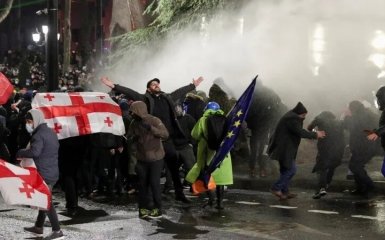Latvia, Lithuania and Estonia announced sanctions in response to the brutal crackdown on peaceful protesters in Georgia. In particular, the head of the Ministry of Internal Affairs was sanctioned.
Points of attention
- Latvia, Lithuania and Estonia imposed sanctions in response to the brutal crackdown on peaceful protesters in Georgia, including the head of the Interior Ministry.
- Clashes with the police took place under the walls of the parliament in Tbilisi, which led to the violent dispersal of protesters.
- The police used violence against journalists and demonstrators, which caused outrage in Georgian society.
- The leader of Georgia appealed to compatriots in Europe and America with a request to express their position regarding the events in the country.
What is known about the sanctions of the Baltic countries
According to Estonian Foreign Minister Margus Tsahkna, the Baltic countries do not welcome "opponents of democracy" and "violators of human rights".
The three Baltic States jointly agreed to impose national sanctions against those who suppressed legitimate protests in #Georgia.
— Margus Tsahkna (@Tsahkna) December 1, 2024
Opponents of democracy & violators of human rights are not welcome in our countries.
🇪🇪🇱🇻🇱🇹🇬🇪
According to the Georgian publication, in particular, the head of the Ministry of Internal Affairs of Georgia, Vakhtang Homelauri, was sanctioned by Latvia, Lithuania and Estonia.
"All officials responsible for the dispersal of protest actions" were under the sanctions of the Baltic states. The restrictive measures include, among other things, a ban on entry into the territory of Latvia, Lithuania and Estonia.
What is important to know about the protests in Georgia
As already mentioned earlier, on November 28, Georgian Prime Minister Iraklii Kobakhidze, who is a de facto protégé of the Kremlin, announced Tbilisi's refusal to negotiate on joining the EU "until the end of 2028."
The pro-Russian politician stated this after the approval of the resolution of the European Parliament with a call not to recognize the result of the last elections in Georgia.
It is important to understand that several Georgian departments have already opposed this decision.
Against this background, the country's leader, Salome Zurabishvili, emphasized that the ruling party has declared war on its own people.
On November 28, a large protest gathered under the walls of the parliament in Tbilisi, clashes with the police began.
As a result, the protesters were violently dispersed with the use of water cannons and tear gas. During the crackdown, security forces beat journalists and their equipment. The actions continued on Friday evening, the police also used violence against the demonstrators.
Georgian leader Salome Zurabishvili publicly appealed to compatriots living in Europe and America. The head of state asks them to express their position regarding the events developing in Georgia.




